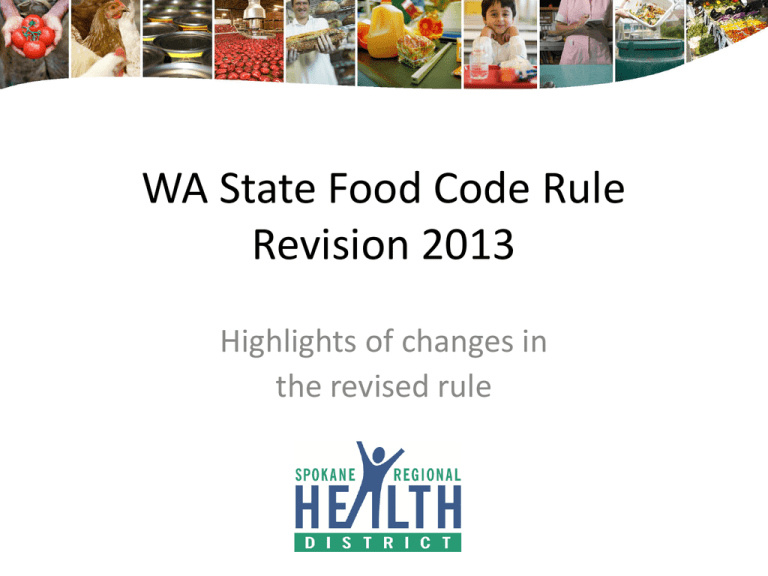WA State Food Code Rule Revision 2013
advertisement

WA State Food Code Rule Revision 2013 Highlights of changes in the revised rule Spokane Regional Health District Food Safety Program Ray Byrne, Food Program Manager Jon Sherve, Food Program Technical Advisor WA State Food Code Rule Revision 2013 FDA Food Code 2009 • Adopted into Chapter 246-215 Washington Administrative Code • Effective Date – May 1, 2013 WA State Food Code Rule Revision 2013 Why Change? • • • • It’s been eight years New science = new rules Clear up vague language Stay consistent with national standards WA State Food Code Rule Revision 2013 Inspection Form & Frequency • Red/Blue Format • Compliance Status • Inspection Interval WA State Food Code Rule Revision 2013 Cook-Chill & Sous Vide (The revised rule adds requirements for cook -chill and sous vide.) Traditional cook-chill and sous vide preparations require sealing food in air-tight bags. This oxygen-reduced, anaerobic environment can promote the growth of bacteria such as Clostridium botulinum (can cause botulism) and Listeria monocytogenes (can cause listeriosis) that grow better when oxygen levels are low. The proposed rule specifies the strict operating procedures and attention to precise temperature control and discard practices the operator must maintain in order to prepare these menu items under an approved HACCP plan. Noncontinuous Cooking (The outgoing rule does not discuss animal products that are partially cook ed then cooled prior to final cook ing before service.) Food establishments that partially cook meat for final cooking later will be required to have written procedures pre-approved by the regulatory authority. The rule requires that the meat be heated for no more than 60 minutes initially and be properly cooled before it is finally cooked to 165°F before service. Meats prepared using an interrupted cooking process, but that do not meet the definition of grill marking (see below), would be required to be cooked to at least 165°F before service. They would NOT be allowed to be served undercooked, even with a consumer advisory. Pre-School Licensing (The outgoing rule does not include modifications for food service in pre-schools with limited facilities.) With several exceptions (such as babysitting, licensed childcare, parent/child programs), preschools are defined as programs that provide organized care and education for children below the age required for kindergarten entry and that operate for two or more days per week with no child enrolled on a regular basis for more than four hours per day. The proposed addition to the rule will limit food menus and preparation steps if the physical facilities available at the pre-school are also limited. Pre-schools that operate with expanded menus will be permitted as routine food establishments and required to comply with the entire food rule. Do you have questions? Food safety staff from your local health jurisdiction or Washington State Department of Health can answer questions or give you additional materials on the food rule. Washington Food Rule UPCOMING Changes 2013 For More Information Grill Marking (Washington State included an exception to the Noncontinuous Cook ing section of the rule to allow limited parcook ing under controlled circumstances.) Meats that are grill marked (seared for less than one minute per side) and held for finish cooking at a later time must be cooled immediately, marked or otherwise indicated that they require additional cooking, and stored separate from ready-to-eat food. Before service, grill marked meats must be heated to the proper internal cook temperature (unless a consumer advisory is posted) before service. They may not be cooled again for another service. Washington’s Revised Food Code Washington State Department of Health Food Rule www.doh.wa.gov/foodrules 2009 FDA Model Food Code Food and Drug Administration www.fda.gov/Food/FoodSafety/RetailFoodPro tection/FoodCode/FoodCode2009/ Highlights of the changes and additions to the Washington State Food Rule Washington State’s Food Service Regulation is Changing Washington State is in the process of updating the state’s food service rule (WAC 246-215) to include provisions from the 2009 FDA Model Food Code after input from industry, consumer, academic, and regulatory partners. This brochure lists several of the modifications to help you prepare for the rule implementation on May 1, 2013 but it is not designed to include every change . Please read the rule language or ask your food inspector if you have additional questions. The proposed rule language is available online (http://www.doh.wa.gov/CommunityandEnvironment/F ood/FoodWorkerandIndustry/FoodSafetyRules/FoodC odeRuleRevision.aspx) Danger Zone (In the outgoing rule, the Danger Zone is 41-140°F.) The Danger Zone for hot holding of Potentially Hazardous Food will lower to 135°F. The current cold holding temperature (41°F) will remain the same. Egg Pooling Employee Health (The outgoing rule does not allow breaking four or more eggs into menu items, other than baked goods and batters, that are served to multiple customers.) (The outgoing rule does not include information about conditional/new employees or potential health exposures for workers in specific facilities.) Eggs that are broken and mixed (such as for scrambled eggs) for multiple customers will be allowed to have four or more eggs as long as the eggs are cooked immediately and cooked to an elevated internal temperature of 155°F (or marked with a proper consumer advisory). Washing Produce (The outgoing rule requires proper washing of produce; new rule clarifies use of running water.) Fresh fruits and vegetables will need to be rinsed in running water before being cut, peeled, or otherwise prepared for service. Produce that is soaked or crisped in water will also need to be rinsed after soaking. Sprouts and herbs were specified in the rule because current practice does not often include rinsing under water prior to service. Service Animals Potentially Hazardous Food (The current rule does not limit service animals to dogs.) (The revised rule adds cut leafy greens and cut tomatoes to the list of PHF.) In food establishments, a service animal means a dog (or miniature horse) that is individually trained to do work or perform tasks for an individual with a disability, including a physical, sensory, psychiatric, intellectual, or other mental disability, as specified in RCW 49.60.218. Potentially Hazardous Food (PHF) need to be kept hot or cold for safety. PHF includes meat, poultry, cooked starches, sliced melons, sprouts, fresh herb and garlic-in-oil mixtures, dairy products, and cooked produce. Like other PHF, cut leafy greens and cut tomatoes will now need to be kept out of the Danger Zone (41-135°F). “Cut leafy greens” means fresh leafy greens whose leaves have been cut, shredded, sliced, chopped, or torn. The term “leafy greens” includes iceberg, romaine, leaf lettuce, butter lettuce, baby leaf, escarole, endive, spring mix, spinach, cabbage, k ale, arugula and chard. The term “leafy greens” does not include herbs such as cilantro or parsley. The term “cut” does not include removing and discarding the exterior leaves. Cottage Foods (Other than bake sales or certain food to be donated, the current rule has no allowance for producing food for the public in private home kitchens. The recent Cottage Food Law is incorporated in the new rule to allow small producers to use their home kitchen.) Oven-baked goods such as cakes, cookies, breads, pastries, and most pies; cereals, trail mixes, granola, nut mixes, jams, jellies, preserves, dry herbs, seasonings, and vinegars will be permitted and inspected by Washington State Department of Agriculture for small-scale retailers to produce in their home kitchen. In addition to restricting current employees with foodborne illnesses or symptoms from working with food, the PIC must ensure that conditional (new) employees are also restricted until they are free of the foodborne illness or symptoms. Food employees that work in a facility that serves a HIGHLY SUSCEPTIBLE POPULATION (such as a nursing home or senior center) must report to the PIC if they: Are diagnosed with Norovirus or Salmonella; Consumed or prepared food implicated in a confirmed disease outbreak; Attended or worked in a setting with a confirmed disease outbreak; Live in the same household as someone who works at or attended a setting implicated in an outbreak; or Live in the same household or eaten food prepared by someone with E. coli, Shigella, Salmonella Typhi, hepatitis A, or jaundice. Wild Mushrooms (The outgoing rule does not include provisions for serving or selling wild mushrooms.) Food establishments may serve or sell wildharvested mushrooms as long as the mushrooms are from an approved list of species, the mushrooms are provided with documentation signed by the mushroom identifier, the records are maintained for ninety days, and the mushrooms are served cooked to 135°F or sold raw for home preparation, such as at farmers’ markets. (Note: This section does not apply to mushrooms grown, processed, or packaged by a licensed food processing plant.) Children’s Menus (The outgoing rule does not prohibit listing an undercooked hamburger or other menu item requiring a consumer advisory on the children’s menu.) Meats and food containing meat that are listed within a children’s menu section will not be allowed to be served undercooked. Danger Zone • The minimum hot holding temperature changes from 140°F to 135°F • The maximum cold holding temperature remains the same at 41°F WA State Food Code Rule Revision 2013 Definitions • Potentially Hazardous Food (PHF) Cut Leafy Greens Cut Tomatoes Interaction of pH and Water Activity WA State Food Code Rule Revision 2013 Notification • Notification of the upcoming Code change has been provided during inspections since 2010. • Written notification has been included with permit renewals since November 2012. • Brochures reviewed and distributed during inspections since December 2012. • SRHD website updated with link to DOH Code Revision webpage. WA State Food Code Rule Revision 2013 Next Steps • • • • • SRHD Action Item – March meeting Continued notification SRHD/WA DOH presentation to WRA - Spokane Chapter WA DOH state wide Workshops Implementation May 1, 2013 WA State Food Code Rule Revision 2013 Thank You • Questions? Spokane Regional Health District Food Program (509) 324-1560, ext. 2 www.srhd.org | www.doh.wa.gov WA State Food Code Rule Revision 2013








